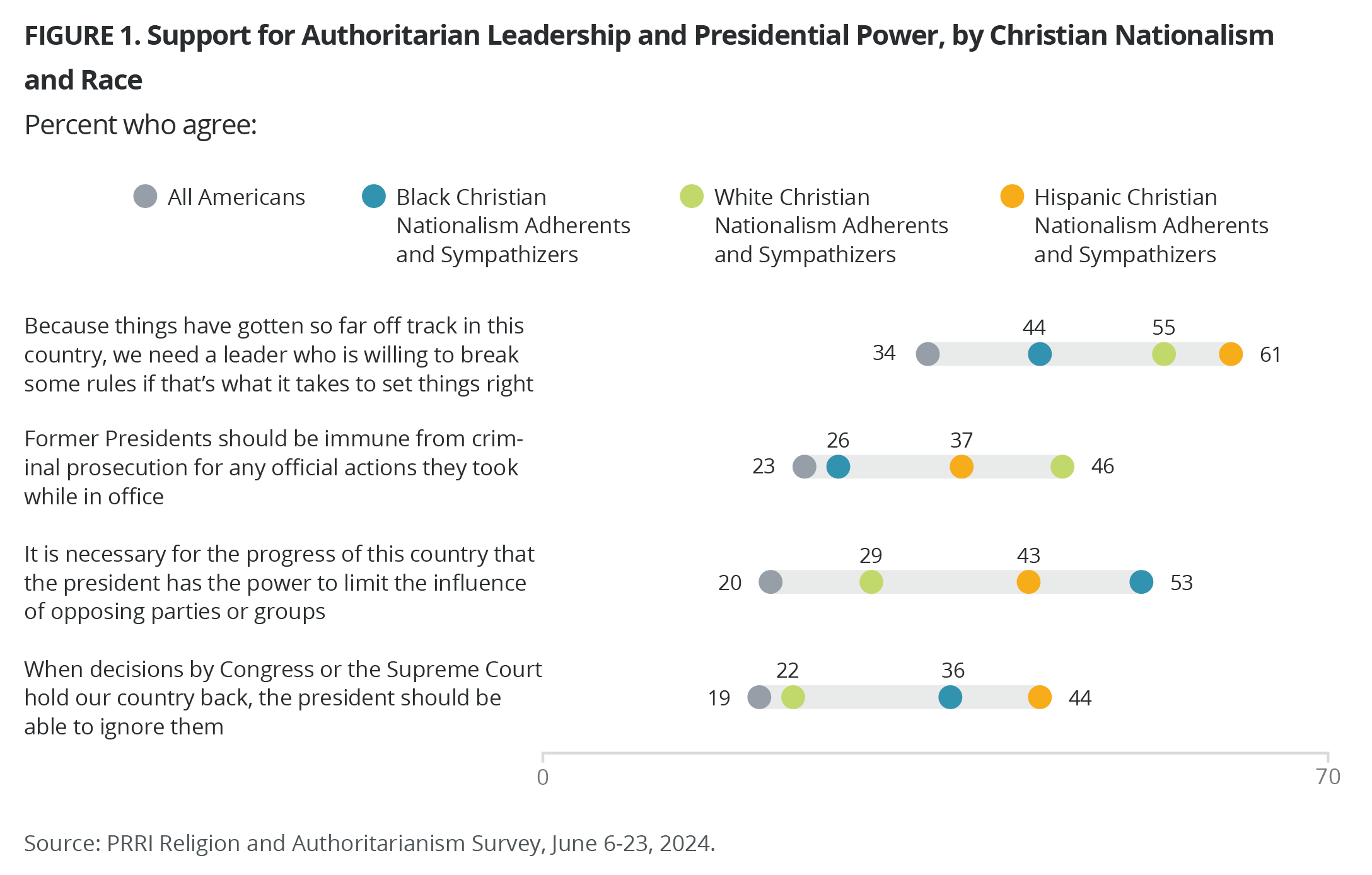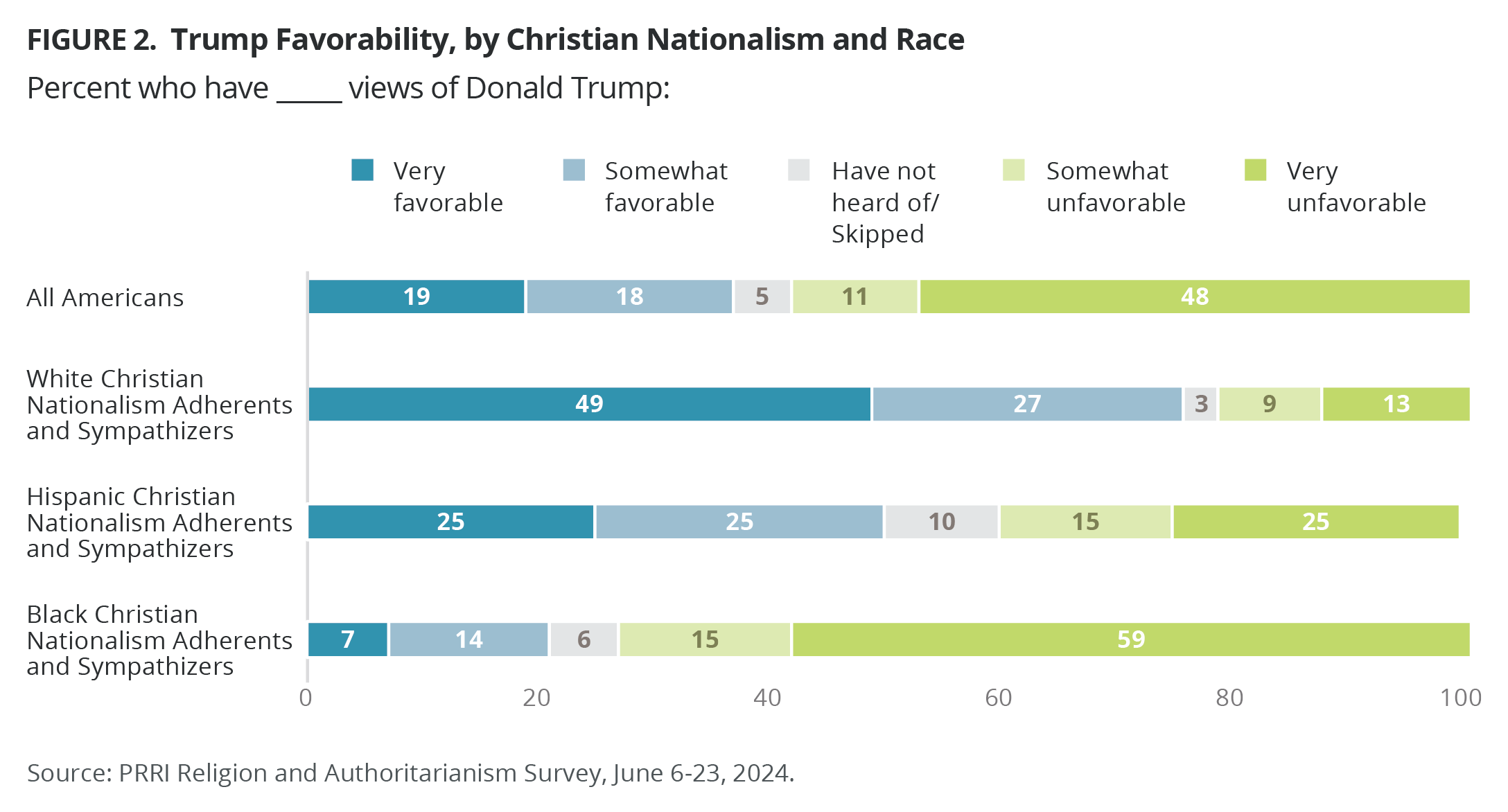Dr. Michael R. Fisher Jr. is an Assistant Professor in the Department of African American and African Studies at Ohio State University and a 2024-2025 PRRI Public Fellow.
PRRI’s 2024 Religion and Authoritarianism Survey shows that, leading up to the 2024 presidential election, a significant percentage of the American public held authoritarian views. Relying on the Right-Wing Authoritarianism (RWA) scale developed by Bob Altemeyer (1981) and the Child-Rearing Authoritarianism (CRA) scale refined by Stanley Felder and Karen Stenner (1997), PRRI finds that about four in ten Americans score high on both the RWA (43%) and CRA (41%) scales. Moreover, strong associations exist between support for authoritarianism and Christian nationalism. Most Americans who qualify as Christian nationalism (CN) Adherents and Sympathizers score high on both the RWA (74%) and the CRA (61%) scales, but there are differences in authoritarian views across race. This Spotlight Analysis examines levels of authoritarianism between Black, Hispanic, and white Americans who qualify as Christian nationalism (CN) Adherents and Sympathizers. The findings suggest further research is needed into the political attitudes of racially minoritized, religious Americans.
Authoritarianism and Christian Nationalism by Race
Though still a majority, Black CN Adherents and Sympathizers (54%) are less likely than their Hispanic (63%) and white (82%) counterparts to score very high or high on the RWA scale. Using the alternative CRA scale to measure authoritarianism, by contrast, Black CN Adherents and Sympathizers (70%) score much higher on authoritarian views compared with their Hispanic (50%) and white (61%) counterparts.

Support for Authoritarian Leadership and Presidential Power
PRRI used four measures to assess the level of support for authoritarian leadership and the extent of presidential power. Americans were asked to indicate their level of agreement or disagreement with several statements on the following topics: (1) a leader’s willingness to break rules, (2) immunity from criminal prosecution for former presidents, (3) presidential power to limit opposing parties, and (4) a president’s ability to ignore Congress or the Supreme Court.
A Leader Who Is Willing to Break Rules
While most Americans (63%) disagree with the statement, “Because things have gotten so far off track in this country, we need a leader who is willing to break some rules if that’s what it takes to set things right,” most CN Adherents and Sympathizers largely support this view, including white and Hispanic CN respondents (55% and 61%, respectively). Interestingly, Black CN Adherents and Sympathizers (44% agree) break with their white and Hispanic counterparts. Most of them (55%), by contrast, disagree with this view.
Immunity From Criminal Prosecution for Former Presidents
Although most CN Adherents and Sympathizers support a leader who is willing to break the rules, they disagree that “Former Presidents should be immune from criminal prosecution for any official actions they took while in office.” Most Black (70%), Hispanic (60%), and white (52%) CN Adherents and Sympathizers disagree compared with only 26%, 37%, and 46%, respectively, who agree. These sentiments mirror the public’s stance on this issue (73% disagree; 23% agree).
Presidential Power to Limit Opposing Parties
Three-quarters of Americans (74%) disagree with the statement, “It is necessary for the progress of this country that the president has the power to limit the influence of opposing parties or groups.” CN Adherents and Sympathizers, however, are less likely than the American public to disagree with this idea; two-thirds of white (66%) and slightly over half of Hispanic (53%) CN Adherents and Sympathizers disagree with the statement. Surprisingly, Black CN Adherents and Sympathizers again break with their white and Hispanic counterparts (44% disagree), with the majority (53%) agreeing that the president should have the power to limit the influence of opposing parties or groups.
A President’s Ability to Ignore Congress or the Supreme Court
Most Americans (77%) disagree with the statement, “When decisions by Congress or the Supreme Court hold our country back, the president should be able to ignore them.” Majorities in each racial group of CN Adherents and Sympathizers also disagreed, though Black (36%) and Hispanic (44%) CN Adherents and Sympathizers are significantly more likely than their white counterparts (22%) and the American public (19%) to agree.

Accounting for High Levels of Authoritarianism Among Black Christian Nationalism Adherents and Sympathizers
Given that Christian nationalism is strongly linked to Republican party affiliation (historically ideologically conservative) and support for Donald Trump, especially among white and Hispanic Americans, it’s also reasonable to expect that most CN Adherents and Sympathizers in these groups would score high on authoritarianism metrics, as survey data reveal. But what accounts for Black CN Adherents and Sympathizers’ high levels of authoritarianism given that they lean more liberal in their views, especially in comparison to their white counterparts?
I offer two possible explanations: (1) Black CN Adherents and Sympathizers’ levels of authoritarianism are elevated due to perceived threat among the group, and (2) the CRA scale isn’t an effective measurement of levels of authoritarianism for Black Americans, most of whom are religious.
Threat and Authoritarianism
People tend to shift from nonauthoritarian to authoritarian attitudes during times of perceived threat, such as economic turmoil or social unrest, while they are more likely to be drawn to nonauthoritarian positions during periods of stability or prosperity.[i] As researchers point out, “when people perceive that the political parties and presidential candidates hold ideological positions very different from them, or have very negative reactions to the presidential candidates, or see a deteriorating national economy, the impact of authoritarian predispositions is greatly magnified.”[ii] Thus, threat may not only produce higher levels of authoritarianism, but the very perception of threat at the societal level potentially amplifies authoritarian predispositions.
The perception of societal threat among Black Americans who qualify as Christian nationalism Adherents and Sympathizers in the run-up to the 2024 presidential election may account for their high levels of authoritarianism. Data from the Religion and Authoritarianism survey were collected in June of 2024, three months after Donald Trump secured enough delegates to become the presumptive Republican nominee for president in the 2024 election. Data from the survey show that a significantly higher percentage of Black CN Adherents and Sympathizers (74%) held unfavorable views of the president, compared with their white (22%) and Hispanic counterparts (40%). The threat of a second Trump presidency, therefore, may have triggered Black CN Adherents and Sympathizers and amplified their existing authoritarian predispositions.

Limitations of the CRA Scale
Researchers argue that the RWA scale too closely resembles the rhetoric of the political Right and thereby conflates authoritarianism with social conservatism.[iii] Because the CRA uses child-rearing values, which are related to authoritarian measures but are less closely associated with conservative political ideology, many researchers contend it’s a more accurate measurement of authoritarianism. However, the CRA scale has notable limitations. Black Americans consistently score higher on it than any other racial group, leading some to conclude that they are more authoritarian in their views. But this is likely not the case.
Efrén O. Perez and Marc Hetherington (2014) argue that the CRA scale doesn’t effectively measure authoritarianism across race because the metaphor of hierarchy and power on which it draws isn’t interracially applicable.[iv] Black Americans don’t hold the same position in society that white Americans do. Therefore, individual dominance at home doesn’t extend to group dominance in society for Black Americans. Moreover, Black and white Americans construe child-rearing items differently, so the desire to enforce conformity in children doesn’t extend to enforcing conformity in society. While a later study by Andrew M. Engelhardt et. al (2021) contends that the child-rearing measures evaluate authoritarianism equally well across racial groups, neither of these studies considers the influence of religion on Black Americans.[v]
The 2023 PRRI Census of American Religion shows that 72% of Black Americans identify as Christian, notably higher than their white (66%) counterparts. Indeed, Christianity has played an important role for Black Americans. For many Black Christians, scriptures like Proverbs 22:6 which encourages parents to “Train children in the right way, and when old, they will not stray,” and Ephesians 6: 1–3 that declares that children should “Obey your parents in the Lord, for this is right. Honor your father and mother—this is the first commandment with a promise—so that it may be well with you and you may live long on the earth” (NRSVUE) are religious mandates. Such beliefs about child-rearing for these Black Americans reflect religious convictions, not political ideology.
This Spotlight Analysis reveals the imperative for more research on American authoritarianism, particularly at the intersection of race and religion. Given that most studies on the subject predominantly examine the attitudes of white respondents, or provide population analyses with splashes of color, i.e., smaller sample sizes of nonwhite respondents, we fall short of the most insightful analysis of the political attitudes of religious Americans across race in the context of studies on religion and authoritarianism in the US. Future studies of authoritarianism among Black Americans should develop alternative metrics for measuring authoritarianism that move beyond the limitations of the CRA scale.
[i] For related studies, see Milton Rokeach, The Open and Closed Mind: Investigations into the Nature of Belief Systems and Personality Systems (Basic Books, 1960); Rupert Wilkinson, The Broken Rebel: A Study in Culture, Politics, and Authoritarian Character (Harper & Row, 1972); Glenn D. Wilson, The Psychology of Conservatism (Academic Press, 1973). Stephen M. Sales, “Economic Threat as a Determinant of Conversion Rates in Authoritarian and Nonauthoritarian Churches,” Journal of Personality and Social Psychology 23, no. 3 (1972): 420–28. Stephen M. Sales, “Threat as a Factor in Authoritarianism: An Analysis of Archival Data,” Journal of Personality and Social Psychology 28, no. 1 (1973): 44–57.
[ii] Stanley Feldman and Karen Stenner, “Perceived Threat and Authoritarianism,” Political Psychology 18, no. 4 (December 1997): 760–61.
[iii] For a representative sample of criticism of the use of the RWA scale to measure authoritarianism, see Stanley Feldman, “Enforcing Social Conformity: A Theory of Authoritarianism,” Political Psychology 24, no. 1 (March 2003): 41–74, and Karen Stenner, The Authoritarian Dynamic, (Cambridge University Press, 2005).
[iv] Efrén O. Pérez and Marc J. Hetherington, “Authoritarianism in Black and White: Testing the Cross-Racial Validity of the Child Rearing Scale.,” Political Analysis 22, no. 3 (July 1, 2014): 398–412.
[v] Andrew M. Engelhardt, Stanley Feldman, and Marc J. Hetherington, “Advancing the Measurement of Authoritarianism,” Political Behavior 45, no. 2 (June 1, 2023): 537–60.




